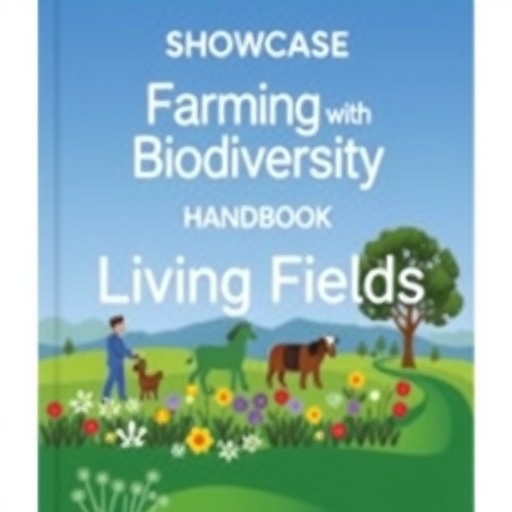The European Union’s ambitious pursuit to harmonize agricultural productivity with ecological preservation has received a significant boost through the culmination of the SHOWCASE project, which recently published its definitive guide titled “Farming with Biodiversity.” This comprehensive handbook consolidates five years of rigorous research conducted across 10 Experimental Biodiversity Areas (EBAs) situated in diverse European agricultural landscapes. It stands out as a pivotal resource for farmers, agricultural advisors, and policymakers eager to transition towards more resilient and sustainable farming methods that integrate biodiversity as a core element rather than an ancillary concern.
Agriculture has traditionally been viewed through the prism of maximizing yield and economic output often at the expense of environmental health. However, SHOWCASE challenges this paradigm by presenting empirical data and practical insights gathered from real-world working farms across Europe. The handbook eloquently details how biodiversity-supportive practices influence not only ecosystem services but also stabilize or even improve crop yields under variable conditions. This evidence serves as a compelling argument for the incorporation of biodiversity as a cornerstone in farming systems, aligning ecological health with farm profitability.
At the heart of the SHOWCASE methodology is an interdisciplinary approach combining ecological experimentation, socio-economic evaluations, and participatory research. This robust framework allowed for testing biodiversity-friendly practices such as the implementation of flower strips, the use of cover crops, and the strategic reduction of pesticide application. These interventions were meticulously monitored to analyze their impact on biodiversity metrics, crop output, and financial viability—parameters that are vital in assessing the practical feasibility of sustainable agriculture at scale.
One of the project’s most groundbreaking aspects is its participatory model that actively involves farmers as co-creators of scientific knowledge. This collaboration ensures that ecological objectives are grounded in economic and social realities, thus promoting adaptive innovations tailored to localized farming conditions. The participatory nature fosters a dynamic exchange of ideas and strategies between scientists and practitioners, effectively bridging the gap between theoretical research and practical agricultural management.
SHOWCASE’s findings decisively demonstrate that the adoption of biodiversity-friendly management leads to measurable increases in ecological diversity on farms without significant compromise to agricultural productivity. The range of outcomes observed across the EBAs reveals the potential to maintain or enhance yields while simultaneously supporting ecological services, such as pollination, pest control, and soil vitality. These results emphasize the possibility of a paradigm shift away from intensive input-dependent farming towards integrated biodiversity-enhancing strategies.
The handbook distills its extensive research into four adaptable strategies designed to guide farmers in enhancing biodiversity within their unique operational contexts. These strategies include managing land to conserve or restore natural habitats, reducing the intensity of farming inputs and soil disturbance, increasing farm-level diversity through approaches like crop rotation and agroforestry, and actively supporting systemic change via monitoring, collaboration, and policy advocacy. This framework is flexible enough to accommodate a diversity of farming systems and regional environmental conditions, enabling wide applicability across the continent.
Moreover, the publication positions these strategies within the context of European policy imperatives such as the Nature Restoration Regulation and the Green Deal’s Farm to Fork and Biodiversity Strategy targets. By providing actionable science-based recommendations, the handbook serves as a vital tool for meeting these ambitious policy goals, which aim to reconcile agricultural production with environmental stewardship at both national and EU-wide levels.
Importantly, the SHOWCASE project provides evidence to inform not only farm management practices but also policy mechanisms, including CAP eco-schemes and results-based payments for ecosystem services. This dual focus underscores the need for multi-level incentives and support systems that reward farmers for integrating biodiversity conservation into their operations, thereby facilitating a socio-economic environment conducive to sustainable agriculture.
The project’s contribution extends beyond European borders by aligning with global biodiversity objectives set within the Kunming-Montreal Global Biodiversity Framework. Its findings illustrate how agricultural landscapes can transition from being biodiversity-depleting zones to vital contributors in the restoration of natural habitats, enhancing ecosystem functions and supporting rural livelihoods simultaneously.
Recognizing the necessity of broad and inclusive dissemination, the Farming with Biodiversity handbook has been translated into ten languages. This linguistic accessibility ensures that its insights reach a wide spectrum of stakeholders in varied cultural and agricultural settings, fostering the practical uptake of biodiversity-friendly practices. In doing so, the project addresses a critical barrier often faced in the translation of scientific knowledge into on-ground impact—language and contextual relevance.
Finally, the handbook and supplementary resources are made freely available through both the SHOWCASE project website and the Living Fields Platform, offering an open-access repository for knowledge exchange and collaboration. This demonstrates the project’s commitment to openness and democratization of information, enabling continuous innovation and dissemination of best practices in biodiversity-integrated farming.
The “Farming with Biodiversity” handbook, backed by solid data and participatory science, emerges not as a mere academic publication but as a catalytic tool poised to reshape European agriculture. It embodies a future where productivity and biodiversity are not antagonistic goals but interdependent attributes of a sustainable agri-food system capable of nourishing people and ecosystems alike.
Subject of Research: Sustainable agriculture and biodiversity integration
Article Title: SHOWCASE Project Unveils “Farming with Biodiversity” Handbook: A Scientific Blueprint for Nature-Positive European Agriculture
News Publication Date: Not specified
Web References:
- SHOWCASE Project: https://showcase-project.eu/
- Farming with Biodiversity Handbook: https://showcase-project.eu/media-center/handbook
- Living Fields Platform: https://living-fields.eu/
Image Credits: Pensoft Publishers
Keywords: Agriculture, Science policy, Agricultural policy, Farming, Sustainable agriculture




